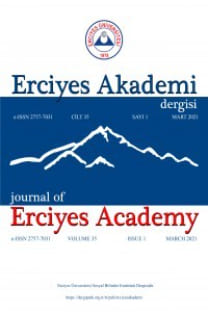ŞEYH SABAH EL-AHMED EL-CABİR ES-SABAH DÖNEMİ KÜÇÜK ÜLKE KUVEYT’İN DIŞ POLİTİKASI
Küçük devlet, Dış politika, Kuveyt, Şeyh Sabah
The Foreign Policy of Small State Kuwait During the Period of Sheikh Sabah Al-Ahmad Al-Jaber Al-Sabah
Small state, Foreign policy, Kuwait, Sheikh Sabah,
___
- Ahrari, M. E. (2008). Rational foreign policy behaviour of a weak state: the case of Kuwait. Australian Journal of International Affairs, 47(1), 131-148.
- Akcan, N. ve Doğan, A. (2020). Es-Sabah sonrasında Kuveyt ve normalleşme süreci. Ortadoğu Analiz, 11(96), 38-41.
- Al Mulla, Y. (2020, 9 Eylül). Kuwait marks 6th anniversary of Emir’s recogntion by UN as ‘humanitarian leader’. Gulf News. https://gulfnews.com/world/gulf/kuwait/kuwait-marks-6th-anniversary-of- emirs-recognition-by-un-as-humanitarian-leader-1.73728331
- Al Mulla, Y. (2020, 29 Eylül). Kuwait’s Sheikh Sabah Al Ahmed Al Sabah: Emir of humanity. Gulf News. https://gulfnews.com/world/gulf/kuwait/kuwaits-sheikh-sabah-al-ahmed-al-sabah-emir-of- humanity-1.72812970
- Albloshi, H. H. (2018, 24 Mayıs). Kuwait’s careful balancing act with Iran, Saudi Arabia. Al-Monitor. https://www.al-monitor.com/originals/2018/05/iran-jcpoa-nuclear-deal-gcc-saudi-kuwait- reaction-division.html
- Al-İbrahim, H. A. (1975). Kuwait: a political study. Kuwait University Press.
- Anckar, D. (2020). Small states: politics and policies. İçinde G. Baldacchino & A. Wivel (Eds.), Handbook on the politics of small states (ss. 38-54). Edward Elgar Publishing.
- Baehr, P. R. (1975). Review: small states: a tool for analysis. World Politics, 27(3), 456-466.
- Baldacchino, G. & Wivel, A. (2020). Small states: concepts and theories. İçinde G. Baldacchino & A. Wivel (Eds.), Handbook on the politics of small states (ss. 2-19). Edward Elgar Publishing.
- Cafiero, G. (2020, 29 Eylül). Kuwait mourns the loss of a wise peacemaker. Inside Arabia. https://insidearabia.com/kuwait-mourns-the-loss-of-a-wise-peacemaker/
- Cengiz, S. (2017). Kuveyt siyasal sistemi ve kasım seçimleri. Ortadoğu Analiz, 9(78), 29-31.
- Crystal, J. (1992). Kuwait: the transformation of an oil state. Westview Press.
- Delozier, E. (2020, 5 Ekim). Kuwait’s precarious mediation role may be imperiled by the Emir’s passing. The Washington Institute. https://www.washingtoninstitute.org/policy-analysis/kuwaits- precarious-mediation-role-may-be-imperiled-emirs-passing
- Edström, H., Gyllensporre, D. & Westberg J. (2019). Military strategy of small states responding to external shocks of the 21 st century. Routledge.
- Elman, M. F. (1995). The foreign policies of small states: challenging neorealism in its own backyard. British Journal of Political Science, 25(2), 171-217.
- Kalin, S. (2020, 29 Eylül). Kuwait’s Emir, a giant of Arab diplomacy, dies at 91. The Wall Street Journal. https://www.wsj.com/articles/kuwaits-ruler-a-giant-of-arab-diplomacy-dies-11601388477
- Keohane, R. O. (1969). Review: Lilliputians’ dilemmas: small states in international politics. International Organization, 23(2), 291-310.
- Keohane, R. O. (1971). The big influence of small allies. Foreign Policy, 2, 161-182.
- Maass. M. (2020). Small states: surviving, perishing and proliferating through history. İçinde G. Baldacchino & A. Wivel (Eds.). Handbook on the politics of small states (ss. 20-37). Edward Elgar Publishing.
- Nations Online Project (2022, 5 Aralık). Political Map of Kuwait. https://www.nationsonline.org/maps/Kuwait-map.jpg
- Rakipoğlu, M. (2021). Kuveyt dış politikası. İçinde İ. N. Telci (Ed.), Körfez dış politikası bağımlılık müdahalecilik, tarafsızlık (ss. 105-124). Ortadoğu Yayınları.
- Rakipoğlu, M. (2020). Kuveyt siyasetinde değişim ve devamlılık. Ortadoğu Araştırmaları Merkezi (ORSAM), Analiz: 268.
- Reinl, J. (2020, 29 Eylül). Legacy of Kuwait’s Emir Sheikh Sabah: farewell ‘Mr fix-it’. Aljazeera. https://www.aljazeera.com/news/2020/9/29/sheikh-sabahs-legacy-farewell-mr-fix-it
- Reuters Staff. (2020, 29 Eylül). Amid war and turmoil, Kuwait Emir struggled for gulf unity. Reuters. https://www.reuters.com/article/uk-kuwait-emir-sheikhsabah-idUKKBN26K2GL
- Sürmelioğlu Parlar, D. (2016). Petrolün ülke politikalarına etkisi: Kuveyt örneği (Yayımlanmamış Doktora Tezi). Karadeniz Teknik Üniversitesi Sosyal Bilimler Enstitüsü.
- Savvy player: Kuwait’s Emir praised after death at 91. (2020, 29 Eylül). Aljazeera. https://www.aljazeera.com/news/2020/9/29/hold-kuwaits-sheikh-sabah-dies-at-the-age-of-91
- Steinmetz, R. & Wivel, A. (2016). Introduction. İçinde R. Steinmetz & A. Wivel (Eds.). Small states in Europe challenges and opportunities (ss. 3-15). Routledge.
- Szalai, M. (2022). The foreign policy of smaller gulf states: size, power and regime stability in the Middle East. UCLA Center for Middle East Development, Routledge.
- Telci, İ. N. & Rakipoğlu, M. (2020). Körfez’in İsrail açılımı. Ortadoğu Araştırmaları Merkezi, Analiz: 263, ISBN: 978-625-7219-03-7.
- Telci, İ. N. (2019). Ortadoğu siyasetinde Körfez’in artan rolü. Ortadoğu Analiz, 10(89), 34-37.
- Thorhallsson, B. & Elinardottir, J. S. (2020). The Nordic states: keeping cool at the top?. İçinde G. Baldacchino & A. Wivel (Eds.). Handbook on the politics of small states (ss. 113-130). Edward Elgar.
- Tür, Ö. & Salık, N. (2017). Uluslararası ilişkilerde “küçük devletler”: gelişimi, tanımı, dış politika ve ittifak davranışları. Uluslararası İlişkiler Dergisi, 14(53), 3-22.
- Vandenbosch, A. (1964). The small states in ınternational polititcs and organization. The Journal of Politics, 26(2), 293-312.
- Wivel, A. (2020). Small states in Europe. İçinde G. Baldacchino & A. Wivel (Eds.), Handbook on the politics of small states (ss. 99-112). Edward Elgar.
- Yayın Aralığı: Yılda 4 Sayı
- Başlangıç: 1987
- Yayıncı: Erciyes Üniversitesi
İBB ATATÜRK KİTAPLIĞI’NDA MC_YZ_K0069 ARŞİV NUMARASI İLE KAYITLI MÜNŞE’ÂT MECMÛ’ASI HAKKINDA NOTLAR
Atabey KILIÇ, Abdülkadir DAĞLAR, Mustafa AKSOY
TARİHSEL ÇERÇEVEDE TÜRKİYE-SUUDİ ARABİSTAN İLİŞKİLERİ VE DIŞ POLİTİKAYA YANSIMASI
Hakkı BÜYÜKBAŞ, Ruveyda GÖRCÜER
HAFIZLIK EĞİTİMİNDE BİLİŞSEL HAZIRBULUNUŞLUK
METAVERSE TOPLUMU: KİMLİK, MEKÂN VE YENİ TOPLULUK BİLİNCİ
YENİ SONDAJLAR IŞIĞINDA ÇİNE TEPECİK HÖYÜĞÜ’NÜN PALEOCOĞRAFYA VE JEOARKEOLOJİSİ (ÇİNE - AYDIN)
Rifat İLHAN, Aylin KARADAŞ, Serdar VARDAR, Ertuğ ÖNER
M. S. VORONTSOV’UN KAFKASYA’YA NAMESTNİK OLARAK ATANMASI
TINI ANALİZLERİNDE KULLANILAN ANALOJİK ÖLÇÜTLER
NİZÂMÎ GENCEVÎ’NİN “HAMSE”SİNDE TANRI İNANCI VE PEYGAMBER SEVGİSİ
POSTMODERN STRATEJİLER IŞIĞINDA ÇAĞDAŞ TÜRK SANATÇILARIN PRATİKLERİNDE FEMİNİST EĞİLİMLER
